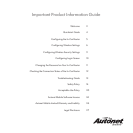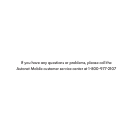18 19
Service
Disconnect your In-Car Router, any charging unit, or any accessory and, if necessary, refer them to qualified service personnel if:
1. The power supply, plug, or connector to your In-Car Router is damaged;
2. Liquid has been spilled or objects have fallen into your In-Car Router, any charging unit, or any accessory;
3. Your In-Car Router, any charging unit, or any accessory has been exposed to rain or water;
4. Your In-Car Router or any accessory becomes very hot to the touch;
5. Your In-Car Router, any charging unit, or any accessory has been dropped or damaged in any way;
6. Your In-Car Router or any accessory does not operate normally in accordance with the instructions contained in any guide
Provided by Autonet Mobile, Inc.;
7. Your In-Car Router or any accessory exhibits a distInct change in performance.
All servicing of the In-Car Router or any accessory should be undertaken only by qualified service personnel. Do not attempt
to disassemble, modify, or repair the In-Car Router or any accessory yourself.
Adjustments
Adjust only those controls for the In-Car Router that are discussed in the instructions contained in any guide provided by
Autonet Mobile, Inc. An improper adjustment of other controls for the In-Car Router may result in damages and may require
extensive work by a qualified technician to restore the In-Car Router or any accessory, as the case may be.
Rough Treatment
Do not drop, strike, or shake severely the In-Car Router. Such actions may damage its internal circuit boards.
Antenna Care
Only use any supplied integral antenna with the In-Car Router. Unauthorized antenna modifications, or attachments could
damage the In-Car Router and may violate U.S. Federal communications commission (FCC) regulations. No one should hold
the antenna or let it come into contact with his or her body when the In-Car Router is in use. Do not use the In-Car Router if
the antenna is damaged. If a damaged antenna touches skin, it may cause a slight burn.
Local Laws
Drivers and their passengers are responsible for determining and complying with any local laws affecting the use of the
In-Car Router. Accordingly, you should familiarize yourself with any applicable laws in jurisdictions where you use the In-Car
Router. Always obey those laws.
Exposure to Radio Frequency Signals
The In-Car Router is a low power radio transmitter and receiver. When it is turned on, it sends out and receives RF signals.
The In-Car Router complies with FCC guidelines respecting safe levels of RF exposure for handled wireless devices, which in
turn are consistent with the following safety standards previously set by certain standards bodies:
1. ANSI/IEEE C95.1-1999, IEEE standard for safety levels with respect to Human Exposure To Radio Frequency
Electromagnetic Fields, 3 Khz to 300 GHz;
2. National Counsel On Radiation Protection And Measurements (NCRP) report 86, - 1986, Biological Effects and Exposure
Criterion for Radio Frequency Electromagnetic Fields; and
3. International Commission on Non-Ionising Radiation Protection (ICNIRP) 1988, guidelines for limiting exposure to
time-varying Electric, magnetic, and electromagnetic fields (up to 300 GHz).
To maintain compliance with FCC exposure guidelines, use only accessories supplied or approved by Autonet Mobile, Inc.


















